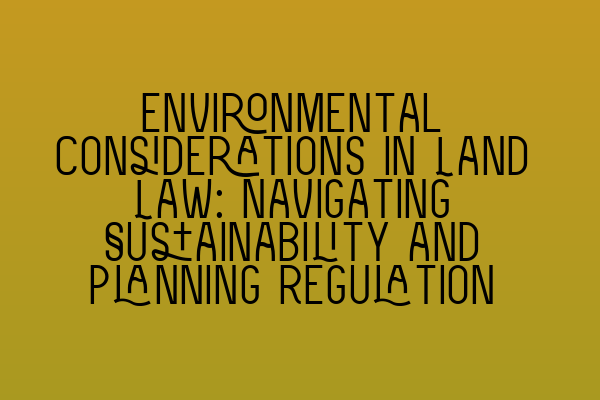Environmental Considerations in Land Law: Navigating Sustainability and Planning Regulation
Welcome to the SQE Property Law & Land Law blog! Today, we will be delving into the vital topic of environmental considerations in land law. As sustainability becomes increasingly important in our society, understanding the intersection between land law and environmental regulations is crucial for both solicitors and property owners. In this article, we will explore the key aspects and challenges of incorporating environmental considerations into land law, and how planning regulations play a pivotal role in ensuring sustainable development.
The Importance of Environmental Considerations
Environmental considerations are fundamental to land law as they help protect and preserve the natural world. With rising concerns over climate change, pollution, and depletion of resources, it is essential for legal professionals to be knowledgeable in this area.
When dealing with land transactions, solicitors must consider the potential impact on the environment. This includes evaluating how the proposed use of the land may affect surrounding ecosystems, mitigating potential environmental risks, and complying with relevant laws and regulations.
Navigating Sustainability in Land Transactions
Integrating sustainable practices into land transactions is becoming increasingly important. Property buyers are more conscious of the environmental impact of their investments, and there is a growing demand for properties that are eco-friendly and energy-efficient.
Solicitors can play a crucial role in guiding clients towards sustainable land investments. By providing comprehensive advice on environmental regulations and highlighting the benefits of sustainable development, solicitors can help clients make informed decisions that align with their values and goals.
One key aspect of sustainable land transactions is conducting environmental due diligence. This involves thoroughly assessing the environmental risks associated with a property, including potential contamination issues, proximity to protected habitats, and compliance with pollution control regulations.
By conducting a detailed environmental assessment, solicitors can help their clients identify any potential red flags early on and advise on the appropriate remedial actions to mitigate risks. This not only protects the environment but also safeguards the clients from potential legal and financial liabilities.
Planning Regulation and Sustainable Development
Planning regulations serve as a crucial tool in promoting sustainable development and ensuring environmental considerations are adequately addressed. These regulations govern how land can be used, developed, and protected.
One of the key mechanisms for incorporating sustainable development into planning regulations is through the use of environmental impact assessments (EIAs). These assessments evaluate the potential environmental effects of proposed developments and provide recommendations to mitigate any adverse impacts.
Planning authorities consider EIAs when granting planning permissions, ensuring that proposed developments are in line with sustainable development goals and do not cause significant harm to the environment. Solicitors need to be well-versed in these regulations to guide clients through the planning process and ensure compliance with the necessary environmental standards.
In addition to EIAs, other planning regulations, such as zoning and conservation laws, help protect environmentally sensitive areas and promote sustainable land use. Solicitors should work closely with planning authorities to navigate these regulations effectively and secure the best outcomes for their clients.
Conclusion
As the importance of sustainability grows, environmental considerations in land law become increasingly vital. Solicitors and property owners must understand the intersection between land law and environmental regulations to ensure the responsible use and management of land.
By integrating environmental considerations into land transactions and navigating planning regulations effectively, solicitors can contribute to a more sustainable future. If you are a solicitor seeking to enhance your expertise in this area, we recommend checking out our related articles:
- Interactive SQE Mock Tests for Contract Law: Test Your Knowledge
- Parties in a Contract: Rights and Responsibilities
- Unveiling Duress and Undue Influence in Contracts
- Essentials of Consideration: Understanding the Backbone of Contracts
- Damages in Contract Law: Assessing Financial Compensation
Feel free to explore our website for more valuable resources and insights on SQE Property Law & Land Law. Thank you for reading!
